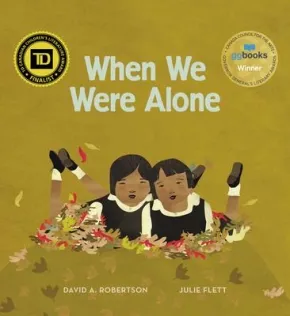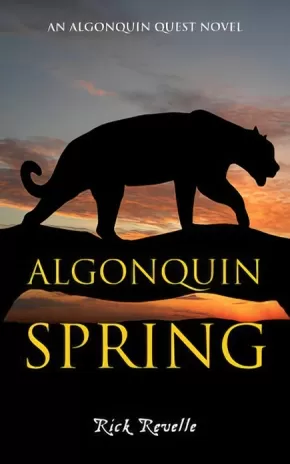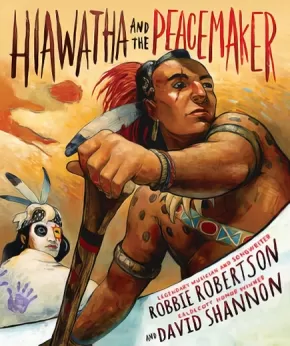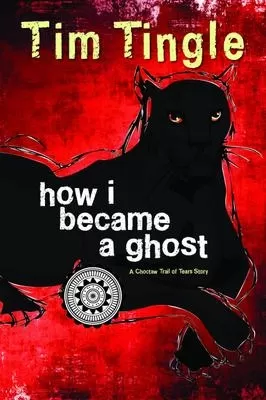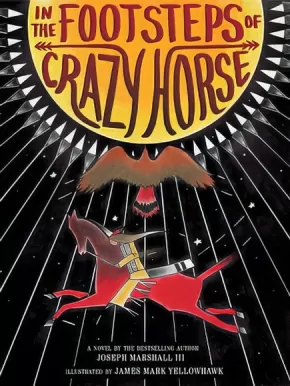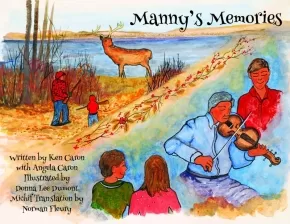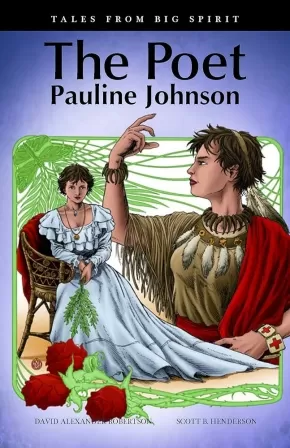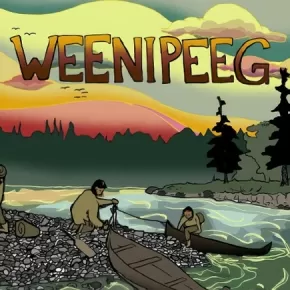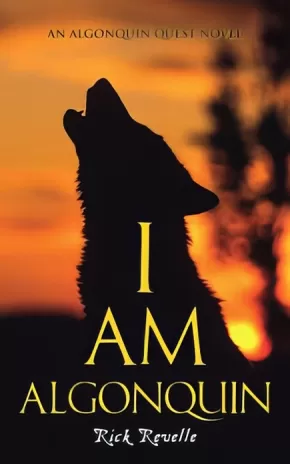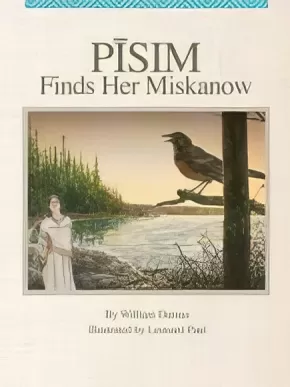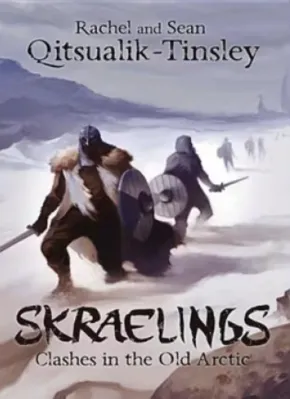
Historical Fiction
76
-
90
of
106 Results;
Sort By
Go To
of 8
The Chief: Mistahimaskwa
$17.95
Artists:
Format:
Paperback
Text Content Territories:
Indigenous Canadian; First Nations; Cree (Nehiyawak);
ISBN / Barcode: 9781553796596
Synopsis:
Synopsis:
On her way to school one day, Sarah is relieved to find the book she’d dropped the day before – shortly after an encounter with a bear. But when she opens it, the story within, about the Cree chief Mistahimaskwa, comes alive. It takes Sarah back to the Saskatchewan Plains of 1832, where the young boy who would become the great chief first learns the ways of his people, to the final days of his life.
Educator & Series Information
The Chief is one book in the Tales From Big Spirit series. Tales from Big Spirit is a unique graphic novel series that delves into the stories of great Indigenous heroes from Canadian history—some already well known and others who deserve to be. Designed to correspond to grades 4–6 social studies curriculums across Canada, these full colour graphic novels could be used in literature circles, novel studies, and book clubs to facilitate discussion of social studies topics. These books will help students make historical connections while promoting important literacy skills.
Tales from the Big Spirit Series Teacher's Guide - Tales from the Big Spirit Series Teacher's Guide. The teacher's guide is designed to help classroom teacher's use the graphic novel series, Tales From Big Spirit, by David Alexander Robertson. The guide provides detailed lessons that meet a wide range of language arts and social studies goals, integrate Indigenous perspectives, and make curricular content more accessible to diverse learners.
The Chief is available in French: Le chef : Mistahimaskwa
Additional Information
30 pages | 6.50" x 10.00"
When We Were Alone
$21.95
Artists:
Format:
Hardcover
Text Content Territories:
Indigenous Canadian; First Nations; Cree (Nehiyawak);
ISBN / Barcode: 9781553796732
Synopsis:
Synopsis:
When a young girl helps tend to her grandmother’s garden, she begins to notice things that make her curious. Why does her grandmother have long, braided hair and beautifully coloured clothing? Why does she speak another language and spend so much time with her family? As she asks her grandmother about these things, she is told about life in a residential school a long time ago, where all of these things were taken away. When We Were Alone is a story about a difficult time in history, and, ultimately, one of empowerment and strength.
Reviews
"When We Were Alone is rare. It is exquisite and stunning, for the power conveyed by the words Robertson wrote, and for the illustrations that Flett created. I highly recommend it." — Debbie Reese, American Indians in Children's Literature.
"…Robertson handles a delicate task here admirably well: explaining residential schools, that shameful legacy, and making them understandable to small children. It’s a dark history, and the author doesn’t disguise that, but he wisely focuses the grandmother’s tale on how, season by season, the students use creativity, imagination, and patience to retain their sense of identity. A beautifully quiet, bold strength arises from the continued refrain “When we were alone” and in how the children insisted on being themselves. Flett’s gorgeous, skillful illustrations have a flattened, faux naïve feel to them, like construction paper collage, a style that works perfectly with the story. She nicely contrasts the school’s dull browns and grays with the riotous colors surrounding Nókom and gets much expression from her simple silhouettes. Spare, poetic, and moving, this Cree heritage story makes a powerful impression." — Kirkus Reviews
"When We Were Alone addresses the topic of residential schools and, just as importantly, aspects of Cree culture and language. There is such gentleness about When We Were Alone that makes it an appropriate book for the even youngest of readers. Simply put, this is a much-needed book. Highly Recommended." — Dr. Kristen Ferguson, CM Magazine
"Robertson's text moves between the present and the past, the girl's questions and Nókom's memories, which deepen and intensify the quiet, powerful way she lives out her own culture, day by day, in the present. A beautifully rendered story of resisitance and love, this is made all the more luminous by Flett's art - not just by flashes of fuschsia or scarlet among ochre grasses, but by her precisely observed images of the compact bodies of the uniformed children, bowed beneath the weight of the scissors, or lovingly tending each other's hair. Highly recommended." — Deirdre Baker, Toronto Star
"When We Were Alone is a story about finding the strength to push forward when everything is against you. It follows a young girl asking her grandmother questions to learn more about her past. The grandmother shares her experience of a time when she was unable to make her own decisions and how she got through it." — The Dalai Lama Center
Educator Information
Recommended Grades: 3 and under.
Grades 10-11 BC English First Peoples resource for the unit First Steps - Exploring Residential School and Reconciliation through Children's Literature.
This book is also available in Swampy Cree syllabics and Roman orthography, as well as the original English: Ispík kákí péyakoyak/When We Were Alone
This resource is also available in French: Quand on etait seuls
Additional Information
24 pages | 8.50" x 7.50" | colour illustrations
Algonquin Spring
$15.99
Format:
Paperback
Text Content Territories:
Indigenous Canadian; First Nations; Anishinaabeg; Algonquin; Beothuk; Haudenosaunee (Iroquois); Kanyen'keha:ka (Mohawk); Mi'kmaq;
ISBN / Barcode: 9781459730632
Synopsis:
Synopsis:
Years after a devastating battle, Mahingan and his tribe struggle to recover a lost loved one.
Six years earlier in the fourteenth century, Mahingan and his tribe fought the Battle of the Falls against the Haudenosaunee. There were many losses, and Mahingan thought he had lost his wife, Wàbananang (Morning Star). But after the battle, he learned she was still alive, taken captive by the Haudenosaunee. Now on a desperate quest to rescue her, Mahingan and his small family are wintering north of the Ottawa River near present-day Lachute, Quebec. If they are to have any hope of recovering Wàbananang, though, they must first survive until spring.
At the same time, over 2,000 kilometres away in present-day Newfoundland, events taking place will affect four Native tribes: Mahingan’s, a group of Mi’kmaq, a Beothuk group, and a band of Haudenosaunee warriors led by Mahingan’s old nemesis, Ò:nenhste Erhar (Corn Dog) — a fierce Mohawk War Chief and Wàbananang’s captor.
Along the way, Mahingan’s brother, Mitigomij, will reveal his true self and powers. Then, an influential Mi’kmaq legend puts a new, powerful twist on events, and threatens to send things spiraling out of Mahingan’s control.
Educator Information
Recommended Ages: 12-15.
Series Information
This novel is part of the Algonquin Quest Series, a series of young adult novels from Algonquin author Rick Revelle.
Additional Information
296 pages | 5.00" x 8.00"
Hiawatha and the Peacemaker
$25.99
Artists:
Format:
Hardcover
Text Content Territories:
Indigenous Canadian; First Nations; Haudenosaunee (Iroquois);
ISBN / Barcode: 9781419712203
Synopsis:
Synopsis:
Born of Mohawk and Cayuga descent, musical icon Robbie Robertson learned the story of Hiawatha and his spiritual guide, the Peacemaker, as part of the Iroquois oral tradition. Now he shares the same gift of storytelling with a new generation.
Hiawatha was a strong and articulate Mohawk who was chosen to translate the Peacemaker’s message of unity for the five warring Iroquois nations during the 14th century. This message not only succeeded in uniting the tribes but also forever changed how the Iroquois governed themselves—a blueprint for democracy that would later inspire the authors of the U.S. Constitution.
Caldecott Honor–winning illustrator David Shannon brings the journey of Hiawatha and the Peacemaker to life with arresting oil paintings. Together, Robertson and Shannon have crafted a new children’s classic that will both educate and inspire readers of all ages.
Includes a CD featuring a new, original song written and performed by Robbie Robertson.
Additional Information
48 pages | 9.50" x 11.25"
How I Became a Ghost: A Choctaw Trail of Tears Story (1 in stock, Out of Print)
$13.95
Format:
Paperback
Text Content Territories:
Indigenous American; Native American; Choctaw;
ISBN / Barcode: 9781937054557
Synopsis:
Synopsis:
A Choctaw boy tells the story of his tribe’s removal from its Mississippi homeland, and how its exodus to the American West led him to become a ghost — one able to help those left behind.
Educator & Series Information
This is the first book in the How I Became a Ghost Series by Tim Tingle.
Recommended for ages 9 to 12.
Additional Information
148 pages | 5.50" x 8.50"
In the Footsteps of Crazy Horse (4 in stock, in reprint)
$23.99
Artists:
Format:
Hardcover
Text Content Territories:
Indigenous American; Native American; Sioux; Lakota;
ISBN / Barcode: 9781419707858
Synopsis:
Synopsis:
Through stories of Lakota leader Crazy Horse, a boy learns about his heritage and himself in this American Indian Youth Literature Award-winning novel from acclaimed author Joseph Marshall III.
Jimmy McClean is a Lakota boy, though you wouldn’t guess it by his name. His mother is Lakota, and his father is half white and half Lakota. Over summer break, Jimmy embarks on a journey with his grandfather, Nyles High Eagle. While on the road, his grandfather tells him the story of Crazy Horse, one of the most important figures in Lakota, and American, history.
Expertly intertwining fiction and nonfiction, celebrated Brulé Lakota author Joseph Marshall III chronicles the many heroic deeds of Crazy Horse, especially his taking up arms against the U.S. government. He fiercely fought against encroachments on the territories and way of life of the Lakota people, including leading a war party to victory at the Battle of the Greasy Grass (the Battle of the Little Bighorn) and playing a major and dangerous role as decoy at the Battle of the Hundred in the Hands (the Fetterman Battle). With Sitting Bull, Crazy Horse was the last of the Lakota to surrender his people to the U.S. Army. Through his grandfather’s tales about the famous warrior, Jimmy learns about his Lakota heritage and, ultimately, himself.
Drawing references and inspiration from the oral stories of the Lakota tradition, Marshall gives readers an insider’s perspective on the life of Tasunke Witko, better known as Crazy Horse.
Reviews
"This powerful introduction to a great warrior and leader invites readers to ponder the meaning of 'hero.'"— Kirkus Reviews
"As Jimmy and his grandfather’s journey comes to an end, the boy has gained much more than a history lesson—he learns a great deal about courage, sacrifice, and the ties that connect him to his ancestors. VERDICT A moving narrative that should be required reading for all students of American history." — School Library Journal
“It provides insights and stories that you don't get from academic historians…There is nothing like it.” — Debbie Reese, American Indians in Children's Literature
Educator Information
Recommended for ages 10 to 14.
Recommended for ages 10 to 14.
Additional Information
176 pages | 6.20" x 8.25" | Black and White Illustrations | Hardcover
Road Allowance Kitten
$17.50
Artists:
Format:
Paperback
Text Content Territories:
Indigenous Canadian; Métis;
ISBN / Barcode: 9781926795720
Synopsis:
Synopsis:
They say, “Home is where the heart is.” For Rosie and Madeline, home also included their pet kitten. Imagine being told you have to leave your home … without your pet. Based on a true story, Road Allowance Kitten gives readers a glimpse into the history of the Road Allowance Métis and their forced removal from their humble, but beloved, homes on the road allowance. Award-winning children’s author Wilfred Burton skillfully shares this story through the eyes of the children involved. The vibrant illustrations by Christina Johns are the perfect accompaniment to this authentic vignette of a little-known part of Prairie history.
Comes with a CD featuring the English and Michif narrations of the book.
Manny's Memories
$17.50
Artists:
Format:
Paperback
Text Content Territories:
Indigenous Canadian; Métis;
ISBN / Barcode: 9781926795164
Synopsis:
Synopsis:
Manny's Memories, by Author Ken Caron with his daughter Angela Caron, introduces us to the Métis community of Round Prairie, Saskatchewan through the eyes of a young boy growing up in the 1940s. Manny shares his boyhood memories of the once vibrant community not too far from Saskatoon's city limits. Though rural life at the time called for hard work, self-sufficiency, and generosity, there was always time to have fun and to enjoy being a young Métis boy. Artist Donna Lee Dumont's visual expression of Manny's Memories helps us see the world as Ken, called "Manny" in his youth, remembers it. Norman Fleury's accompanying Michif translation and narration returns to the language which Manny often hears as a boy. Manny's Memories leaves us with a rare and satisfying glimpse of life not so long ago.
Educator Information
Grade Level: Primary
Format: Book/CD, English/Michif-Cree
Additional Information
36 pages | 10.94" x 8.46"
My First Métis Lobstick
$17.50
Artists:
Format:
Paperback
Text Content Territories:
Indigenous Canadian; Métis;
ISBN / Barcode: 9781926795171
Synopsis:
Synopsis:
Leah Marie Dorion’s My First Métis Lobstick takes young readers back to Canada’s fur trade era by focusing on a Métis family’s preparations for a lobstick celebration and feast in the boreal forest. Through the eyes of a young boy, we see how important lobstick making and ceremony was to the Métis community. From the Great Lakes to the present-day Northwest Territories, lobstick poles—important cultural and geographical markers, which merged Cree, Ojibway, and French-Canadian traditions—dotted the landscape of our great northern boreal forest. This little-known aspect of Métis history vividly comes to life through Leah Marie Dorion’s crisp prose and stunning gallery-quality artwork.
Educator Information
This is a dual-language picture book delivered in English and Michif. It includes a CD.
Additional Information
72 pages | 10.98" x 8.54" | Michif translation by Normal Fleury
Not My Girl
$9.95
Artists:
Format:
Paperback
Text Content Territories:
Indigenous Canadian; Inuit; Inuvialuit (Mackenzie Inuit);
ISBN / Barcode: 9781554516247
Synopsis:
"Culturally relevant, accurate, and soft, painterly illustrations depict the sequence of events and reinforce the bittersweet and tender reunion of Olemaun with her family."— Natalie Braham, School Library Journal, September 2014
Synopsis:
Margaret can't wait to see her family, but her homecoming is not what she expected.
Two years ago, Margaret left her Arctic home for the outsiders' school. Now she has returned and can barely contain her excitement as she rushes towards her waiting family -- but her mother stands still as a stone. This strange, skinny child, with her hair cropped short, can't be her daughter. "Not my girl!" she says angrily.
Margaret's years at school have changed her. Now ten years old, she has forgotten her language and the skills to hunt and fish. She can't even stomach her mother's food. Her only comfort is in the books she learned to read at school.
Gradually, Margaret relearns the words and ways of her people. With time, she earns her father's trust enough to be given a dogsled of her own. As her family watches with pride, Margaret knows she has found her place once more.
Based on the true story of Margaret Pokiak-Fenton, and complemented by evocative illustrations, Not My Girl makes the original, award-winning memoir, A Stranger at Home, accessible to younger children. It is also a sequel to the picture book When I Was Eight. A poignant story of a determined young girl's struggle to belong, it will both move and inspire readers everywhere.
Reviews
"For kids who are ready to tackle the not so sunny portion of history, this is a deeply felt exploration of identity and cultural crisis rendered as a deep, satisfying sigh appropriate for sharing aloud." — BCCB The Bulletin of the Center for Children's Boo, August 2014
"Culturally relevant, accurate, and soft, painterly illustrations depict the sequence of events and reinforce the bittersweet and tender reunion of Olemaun with her family."— Natalie Braham, School Library Journal, September 2014
Educator Information
Recommended for ages 6 to 9.
This book is available in French: Ou est ma fille?
Additional Information
36 pages | 9.00" x 9.00"
The Poet: Pauline Johnson
$17.95
Artists:
Format:
Paperback
Text Content Territories:
Indigenous Canadian; First Nations; Haudenosaunee (Iroquois); Kanyen'keha:ka (Mohawk);
ISBN / Barcode: 9781553794813
Synopsis:
Synopsis:
Although Kathy loves poetry, she is far too shy to recite it in front of her class. But the story of Pauline Johnson, renowned as the "Mohawk Princess," inspires Kathy to overcome her stage fright. Pauline, from the Grand River Reserve in Ontario, crisscrossed the country, reciting her poems to far-flung communities, making her among the most beloved literary figure of the Edwardian era.
Educator & Series Information
Tales from Big Spirit is a unique graphic novel series that delves into the stories of great Indigenous heroes from Canadian history—some already well known and others who deserve to be. Designed to correspond to grades 4–6 social studies curriculums across Canada, these full colour graphic novels could be used in literature circles, novel studies, and book clubs to facilitate discussion of social studies topics. These books will help students make historical connections while promoting important literacy skills.
Grades 4-6
Tales from the Big Spirit Series Teacher's Guide - Tales from the Big Spirit Series Teacher's Guide
The teacher's guide is designed to help classroom teacher's use the graphic novel series, Tales From Big Spirit, by David Alexander Robertson. The guide provides detailed lessons that meet a wide range of language arts and social studies goals, integrate Indigenous perspectives, and make curricular content more accessible to diverse learners.
The Poet: Pauline Johnson is available in French: La poète : Pauline Johnson
Additional Information
30 pages | 6.50" x 10.00"
Weenipeeg
$14.95
Format:
Paperback
Text Content Territories:
Indigenous Canadian; First Nations; Cree (Nehiyawak);
Synopsis:
The name Weenipeeg (or Winnipeg) is known to mean dirty water. But how did it get that name? Weepipeeg, a story carried on by Elder Bill Ballantyne, is a children’s book that recounts the gripping true events that led to Winnipeg receiving its name. A journey story at its heart, this beautifully illustrated book will have you on the edge of your seat, while it shares important traditional knowledge.
I Am Algonquin
$15.99
Format:
Paperback
Text Content Territories:
Indigenous Canadian; First Nations; Anishinaabeg; Algonquin; Haudenosaunee (Iroquois); Huron-Wendat (Ouendat);
ISBN / Barcode: 9781459707184
Synopsis:
Synopsis:
This book paints a vivid picture of the original peoples of North America before the arrival of Europeans. The novel follows the story of Mahingan and his family as they live the traditional Algonquin way of life in what is now Ontario in the early 14th century. Along the way we learn about the search for moose and the dramatic rare woodland buffalo hunt, conflicts with other Native nations, and the dangers of wolves and wolverines. We also witness the violent game of lacrosse, the terror of a forest fire, and the rituals that allow Algonquin boys to be declared full-grown men.
But warfare is also part of their lives, and signs point to a defining conflict between Mahingan's nation, its allies the Omàmiwinini (Algonquin), Ouendat (Huron), and the Nippissing against the Haudenosaunee (Iroquois). The battle's aftermath may open the door to future journeys by Mahingan and his followers.
Educator Information
Recommended Ages: 12-15.
Series Information
This novel is part of the Algonquin Quest Series, a series of young adult novels from Algonquin author Rick Revelle.
Additional Information
280 pages | 5.00" x 8.00"
Pīsim Finds Her Miskanow (7 in Stock) - ON SALE
$24.00 $29.00
Artists:
Format:
Hardcover
Text Content Territories:
Indigenous Canadian; First Nations; Cree (Nehiyawak);
ISBN / Barcode: 9781553793946
Synopsis:
Synopsis:
Pīsim Finds Her Miskanow is about a week in the life of Pīsim, a young Cree woman living in the late 1600s. The 1993 archaeological excavation of the remains of a woman and her belongings from Nagami Bay at South Indian Lake, Manitoba, was the inspiration for the story. In the story, Pīsim begins to both recognize her purpose for being and develop her gifts for fulfilling her purpose. This beautifully illustrated book includes drawings of artifacts, definitions and descriptions, historical facts and information, Cree songs and words, maps, recipes, and much more.
Skraelings
$10.95
Format:
Paperback
Text Content Territories:
Indigenous Canadian; Inuit;
ISBN / Barcode: 9781927095546
Synopsis:
Synopsis:
In this adventurous novel—set in the ancient Arctic, but narrated for modern readers by an inquisitive and entertaining contemporary narrator—a young, wandering Inuit hunter named Kannujaq happens upon a camp in grave peril. The inhabitants of the camp are Tunit, a race of ancient Inuit ancestors known for their shyness and meekness. The tranquility of this Tunit camp has been shaken by a group of murderous, pale, bearded strangers who have arrived on a huge boat shaped like a loon.
Unbeknownst to Kannujaq, he has stumbled upon a battle between the Tunit and a group of Viking warriors!
As the camp prepares to defend itself against the approaching newcomers, Kannujaq and a Tunit shaman boy named Siku discover that the Vikings may have motivations other than murder and warfare at the heart of their quest.
This lush historical fiction is steeped in Inuit traditional knowledge and concepts of ancient Inuit magic. The unique time and place brought to life in this exciting novel will delight young fans of historical and fantastical fiction alike.
Educator Information
Recommended for ages 12+
Additional Information
120 pages | 6.00" x 9.00"
Sort By
Go To
of 8




